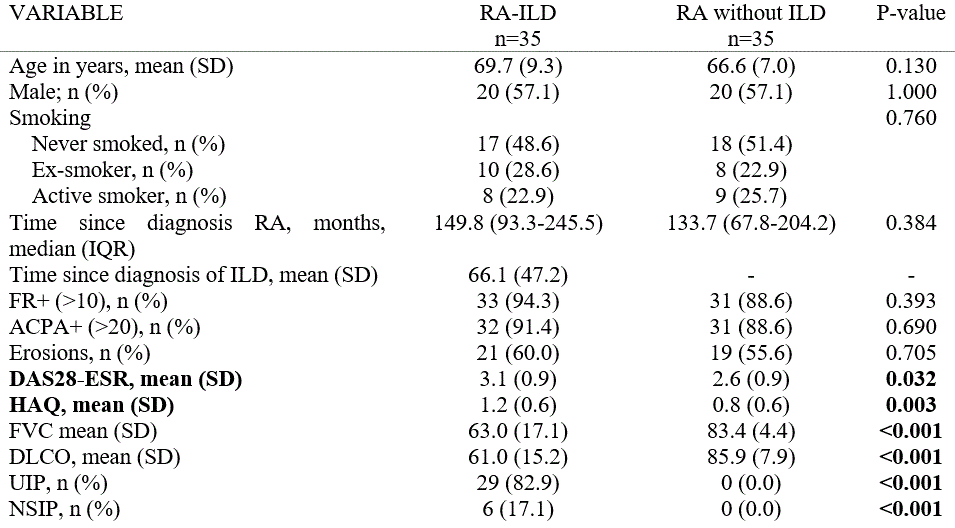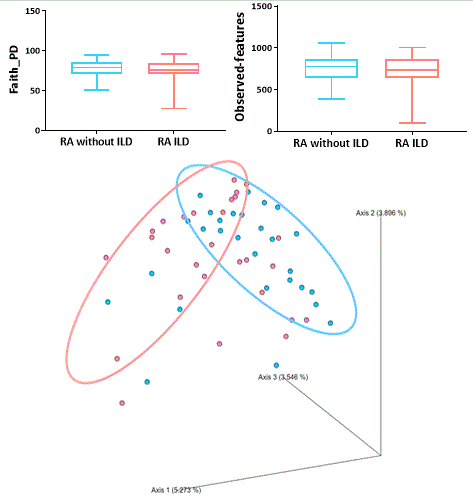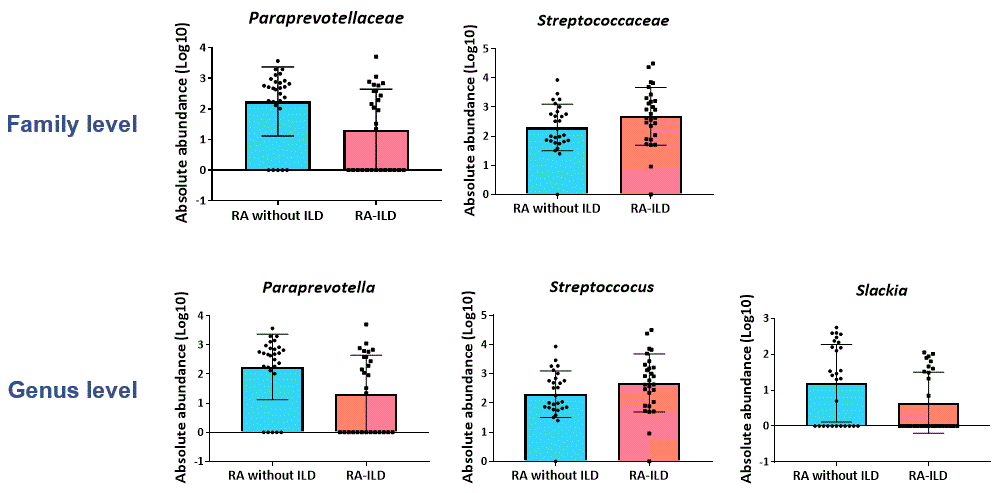Session Information
Session Type: Poster Session C
Session Time: 9:00AM-11:00AM
Background/Purpose: Gut microbiota has been related to rheumatoid arthritis (RA), inflammation, and it’s severity. Interstitial lung disease (ILD) is the most frequent non-pleural pulmonary manifestation and causes high morbidity and mortality in RA patients. However, the association between gut microbiota and RA associated ILD (RA-ILD) is still unknown. In the same way, there are currently no useful biomarkers for the diagnosis and prognosis of RA-ILD. Therefore, the objective of the present study is to analyze gut microbiota and permeability in RA-ILD patients and evaluate it´s association with RA-ILD and pulmonary progression.
Methods: Nested case-cohort study of 2 prospective cohorts of patients with RA with and without ILD. The cohorts were matched for age, sex, and time of RA evolution. All cases systematically underwent high-resolution computed tomography (HRCT) and pulmonary function testing (PFT) on the diagnosis of ILD. ILD was defined according to lung biopsy or HRCT based on the standard criteria of the American Thoracic Society/European Respiratory Society. Pulmonary progression was defined as the worsening of the FVC > 10% or DLCO > 15%. Gut microbiota was measured by the 16S rRNA gene and the sequences were processed using the Quantitative Insights into Microbial Ecology (QIIME2). Serum lipopolysaccharide-binding protein (LBP) and lipopolysaccharide (LPS) were measured as markers of gut permeability. Demographic, clinical, laboratory, and treatment-related data were recorded. Disease activity was measured by Disease Activity Score-28 with Erythrocyte Sedimentation Rate (DAS28-ESR), and the function using the Health Assessment Questionnaire (HAQ). We performed a descriptive analysis and Cox regression analysis to identify factors associated with ILD.
Results: 35 RA-ILD and 35 RA without ILD patients were included. After a mean (SD) period of 66,1 (47,2) months, pulmonary progression criteria was observed in 13 patients (37.1%). Compared with controls, RA-ILD had greater values of DAS28-ESR (p=0.032) and higher HAQ scores (p=0.003). They also had higher levels of serum LPS (p = 0.007) and more abundance of Streptococcus genus (p = 0.087), as well as a lower abundance of Slackia (p = 0.022) and Paraprevotella genera (p = 0.082). RA-ILD patients with pulmonary progression had a higher abundance of Streptococcus genus (p = 0.090) and a lower abundance of Slackia genus. In Cox regression analysis, the moderate-high activity of DAS28-ESR (HR [IC 95%], 3.53 [1.20-6.98]; p=0.017), LPS (HR [IC 95%], 1.12 [1.02-1.23]; p=0.018) and the Slackia genus (HR [IC 95%], 0.98 [0.97-0.99]; p=0.010) were associated with RA-ILD.
Conclusion: RA-ILD patients showed increased gut permeability and also displayed a different pattern of gut microbiota associated with ILD diagnosis and prognosis. These findings may enable the discovery of potential RA-ILD biomarkers.
Abbreviations. ACPA: anticitrullinated peptide antibody; DAS28: Disease activity score; DLCO: diffusing capacity of the lung for carbon monoxide; DMARDs: disease-modifying antirheumatic drug; ESR: erythrocyte sedimentation rate; FEV1: forced expiratory volume in the first second; FVC: forced vital capacity; HAQ: Health Assessment Questionnaire; HCRT: high-resolution computed tomography; NSIP: nonspecific interstitial pneumonia; RF: rheumatoid factor; SD: standard deviation; UIP: usual interstitial pneumonia.
Alpha diversity (above) and Beta diversity (bottom). To compare the populations of both groups, the Jaccard similarity index was used and significant differences (p=0.017) were observed between both groups. Blue dots: RA without ILD; Pink dots: RA-ILD.
Graphs represent the families and genera with statistically significant differences. At the family level, Paraprevotellaceae (p=0.007) was significantly decreased, while Streptococcaceae (p=0.050) was significantly increased in RA-ILD patients compared to RA patients without ILD. At the genus level, Paraprevotella (p=0.007) and Slackia (p=0.041) were significantly decreased, while Streptococcus (p=0.050) was significantly increased in RA-ILD patients compared to RA patients without ILD.
To cite this abstract in AMA style:
Lisbona-Montañez J, Ruiz-Limon P, Mucientes A, Mena Vazquez N, Moreno-Indias I, MANRIQUE S, Cano-García L, Redondo-Rodríguez R, tinahones F, Fernandez-Nebro A. Gut Microbiota and Permeability Biomarkers for Diagnosis and Prognosis in Rheumatoid Arthritis Associated Interstitial Lung Disease [abstract]. Arthritis Rheumatol. 2023; 75 (suppl 9). https://acrabstracts.org/abstract/gut-microbiota-and-permeability-biomarkers-for-diagnosis-and-prognosis-in-rheumatoid-arthritis-associated-interstitial-lung-disease/. Accessed .« Back to ACR Convergence 2023
ACR Meeting Abstracts - https://acrabstracts.org/abstract/gut-microbiota-and-permeability-biomarkers-for-diagnosis-and-prognosis-in-rheumatoid-arthritis-associated-interstitial-lung-disease/



